How High Can Crude Oil Fly?
Commodities / Crude Oil Jul 17, 2007 - 07:19 PM GMTBy: Gary_Dorsch
 In London, the price of North Sea Brent, the benchmark for two-thirds of the world's oil, touched an all-time high of $78.40 per barrel this week, with no sense of alarm at the world's top central banks. Regarded as a key indicator of global inflation, central bankers are sitting in stone faced silence about the surge in crude oil, and that's been good news for bullish speculators in gold and energy shares.
In London, the price of North Sea Brent, the benchmark for two-thirds of the world's oil, touched an all-time high of $78.40 per barrel this week, with no sense of alarm at the world's top central banks. Regarded as a key indicator of global inflation, central bankers are sitting in stone faced silence about the surge in crude oil, and that's been good news for bullish speculators in gold and energy shares.
After all, higher interest rates won't produce one extra barrel of oil. When asked about the high price of crude oil on July 10th, Federal Reserve chief Ben “helicopter” Bernanke replied, “Inflation is less responsive than it used to be to changes in oil prices and other supply shocks. If inflation expectations are well anchored, changes in energy and food prices should have relatively little influence on “core” inflation.”
Crude oil has been on a wild roller coaster ride for the past 18-months, gyrating within a wide range, between a low of $50 per barrel and a high of $78 /barrel, and dragging global oil company shares along for the ride. With the Dow Jones Industrials hyper inflating to the 14,000 level, and oblivious to record high oil prices, why should US central bankers rock the boat with higher interest rates?
Brief Historical Perspective on Crude Oil
In today's world of 20-second sound bites, and information overloaded with lots of static and noise, it's easy to lose one's historical perspective on the markets. The starting point for the latest six-month rally in North Sea Brent was from the depths of despair, at $51 per barrel. So after a 50% increase in oil prices to record highs of $78.40 /bl for Brent, traders are asking just how high can crude oil fly, or does a big tumble lie ahead for the second half of 2007?
It was one year ago to the day, when Iran's proxy in Lebanon, the Hizbollah terror network, sent a commando unit across the border into Israel and ambushed an Israeli patrol, killing eight soldiers and kidnapping two. The raid sparked a swift Israeli response, including the bombardment of Hizbollah strongholds in Beirut and a 34-day blockade of Lebanon by land, sea, and air.
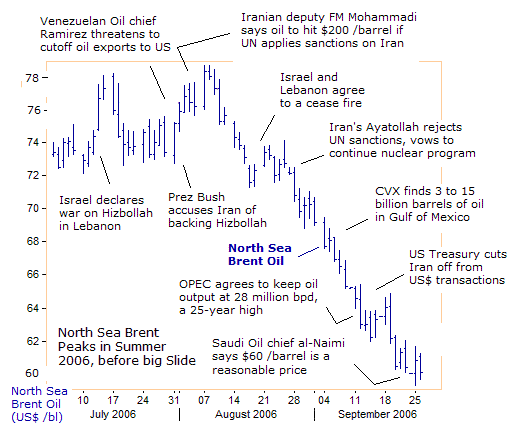
For the first three days of the war, the world held its collective breathe, wondering if Iran and Syria would jump into the fray, and trigger a wider war in the Middle East, that could send crude oil prices soaring. On July 30th 2006, Venezuela's oil minister Rafael Ramirez threatened to cut off oil exports to the US, if President Bush used the Israeli- Hizbollah war as a pretext to attack Iran's nuclear installations.
The Israeli - Hizbollah skirmish did lead to a “war of words” between US President Bush and Iranian leaders from the sidelines, but none of the tough rhetoric materialized into action. Once it became apparent that Israeli PM Ehud Olmert could not engineer a crushing defeat of Hizbollah, the US and other Western powers asked for a UN cease fire, which ushered in a huge slide in the crude oil market.
Few operators in the crude oil market could have imagined that North Sea Brent would tumble by $27 per barrel, losing more than a third of its value, to as low as $51 per barrel by January 2007. But behind the scenes, the OPEC cartel kept its oil output steady at 28 million barrels per day, near a 25-year high, greasing the skids in crude oil and aiming for a “reasonable target” of $60 per barrel.
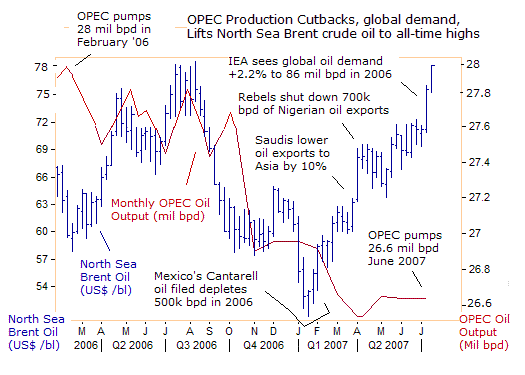
Once crude oil tumbled to the $60 / barrel range, and sent signals to the media, in support of production cutbacks to stabilize oil prices. On October 20, 2006, OPEC agreed to curb its output by 1.2 million barrels per day, its first cut for more than two years, to halt the precipitous fall in prices. But crude oil continued to plunge in January to as low as $51 per barrel, when it became apparent that OPEC was cheating on its pledge to cut oil supplies .
Since hitting rock bottom at $51 /barrel, the pendulum has swung the other way with North Sea Brent oil prices climbing upward to record highs of $78.40 this week. A booming global economy, led and , the unexpected loss of 1.2 million bpd of crude oil exports from and , and OPEC's output cutbacks of 1.2 million bpd, paved the way for the historic rebound in oil prices.
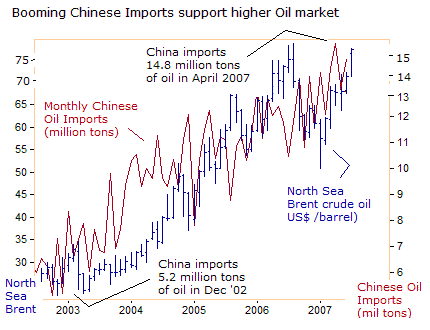
Global demand for crude oil is led by China and its 11% economic growth rate. China's crude oil imports were up 20% in June from a year earlier to 14.1 million tons. In the first half of this year, China's oil imports rose 11.2% from the same year-ago period to 81.5 million tons. China has become Iran's biggest customer, buying 15% or 335,000 bpd of Iran's oil exports last year, and Beijing uses its UN veto to blunt Washington's drive to squeeze Iran's oil industry and economy.
Iranian – Saudi Truce Turns Oil prices Upward
Iran's Ayatollah Khamenei and his sidekick, Mahmoud Ahmadinejad, are making all the right moves in their quest of nuclear invincibility. Spinning European diplomats in an endless circle by dangling a few multi-billion oil and construction contracts is a simple trick. But keeping the Washington neo-cons at bay, with the US army perched on Iran's eastern, southern, and western borders is no small feat.
After four years of fruitless negotiations with the Europeans, IAEA chief Mohamed El-Baradei says Iran has become a “master of uranium enrichment,” and has reached “the point of no return,” in acquiring the technology to build a nuclear bomb. That's re-inflating the “Iranian war” premium into global oil prices. At the same time, Tehran is turning US public opinion against the war in Iraq, with more than 70% of Americans favoring a withdrawal of US troops from Iraq by April.
Iran is supporting the anti-US insurgency in Iraq with money and weapons that has taken the lives of 3,600 US soldiers. The Iraqi war is costing US taxpayers about $10 billion per month, on top of $500 billion tacked onto the national debt so far. Thus, President George W. Bush's approval rating has plunged to a new low of 29% in July, amid growing dissent over his war strategy, down from 33% in early June.
On July 14th, Bush warned a national radio audience, “To begin to bring troops home before our commanders tell us we are ready would be dangerous for our country. It would mean surrendering the future of Iraq to al-Qaeda, risking a humanitarian catastrophe, and allowing the terrorists to establish a safe haven in Iraq and gain control of vast oil resources that could be used to fund new attacks on America.
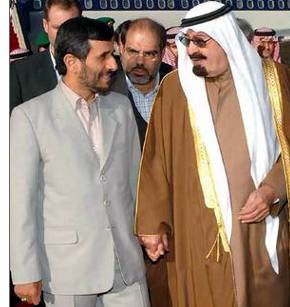
But Saudi king Abdullah is already several steps ahead of public opinion. On March 3 rd 2007, King Abdullah of decided to hedge against the possibility of an early withdrawal from , by inviting Iranian hard-line president Mahmoud Ahmadinejad to an extraordinary meeting, promising a thaw in relations between the two regional petro-powers. Ahmadinejad's first official visit to Saudi Arabia was marked by decidedly public shows of warmth and friendship between the leaders, as the men embraced, and at times held hands in an Arab sign of close friendship.
“Both and are aware of the enemies' conspiracies,” Mr. Ahmadinejad told reporters on March 5 th . “We decided to take measures to confront such plots, and hopefully this will strengthen Muslim countries against oppressive pressures by the imperialist front.” Thus, the price of lasting Iranian friendship with Riyadh might be the removal of the military from the Persian Gulf region .
At risk are Iraq's 113 billion barrels of proven oil reserves and 200 billion barrels of probable reserves in the western half of the country. In the eyes of American neo-cons, Sunni Saudi Arabia, Egypt, Jordan and the small Gulf monarchies are all threatened by the emergence of a super-confident Iran, intent on acquiring nuclear weapons, and dominating a region that contains 2/3's of the world's oil reserves.
Ahmadinejad received his booty a few weeks later, when Saudi Arabia, notified oil refiners in Japan, South Korea, Taiwan and China that it would cut its oil exports by 10% for April. Saudi Arabia's oil production cutbacks helped push North Sea Brent above $60 per barrel, boosting Iran's oil income, and turning Iran's national budget away from a possible deficit and back into a surplus.
Iran demands Payment for Oil in Euros and Japanese Yen
While the price of Iranian oil is still quoted in US dollars, Hojjatollah Ghanimifard, chief of the National Iranian Oil Company (NIOC), says roughly 70% of Iran's oil income is now paid in currencies besides the US dollar. “Almost all of our European clients and some of our Asian customers have agreed to make payments in currencies other than dollars,” he said.
Not since Saddam Hussein in November 2000, has an OPEC member dared to ask for payment of oil in a currency other than the US dollar. Saddam converted $10 billion of his currency reserves to Euros, and was ousted from power 2-½ years later. The US, in alliance with the British, intervened in Iraq militarily in March 2003, installed its own authority to run the country, and after the invasion, announced that payment for Iraqi oil would be in US dollars only.
Since then, the Euro has emerged to challenge the US dollar's hegemony in world trade, and is the second most held currency by central banks. The gross domestic product of the Euro zone is roughly the same as that of the US, and its population is 60% bigger. Furthermore, the Euro zone's external accounts are much better balanced, with a current account deficit of only 3.2 billion euros ($4.2 billion) over the past 12-months, compared to an $833 billion US deficit.
Sixty percent of OPEC's oil sales are sold to Europe, so it would make economic sense for OPEC to ask for Euros in exchange for its oil. But the House of Saud needs a buffer against its Shiite enemies in southern Iraq and Iran, which it receives from US military. Thus, the Arab Oil kingdoms are still sticking with the US dollar, and recycle much of their petrodollars into US Treasuries thru their London brokers.
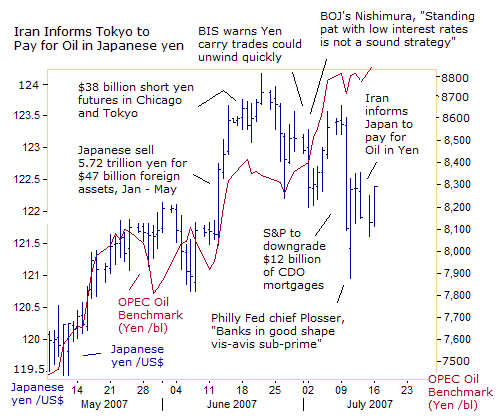
Now in a very interesting turn of events, Ayatollah Khamenei is demanding that Tokyo pay for its Iranian oil imports in Japanese yen, rather than US dollars. The request for payment of Iranian oil payments in yen is believed to be part of Tehran's fear of a possible seizure of its assets by the US government amid tensions over its nuclear weapons program. So far, the dollar has shown little reaction to the Ayatollah's latest gambit, holding steady above 122-yen.
Japanese oil imports from Iran have fallen sharply to 323,000 bpd in May 2007, from roughly 532,000 bpd in 2005. Still, with the cost of OPEC's benchmark crude oil basket spiraling upwards to a record high of 8,800 yen per barrel, Japanese oil imports from Iran would cost around $10 billion to $12 billion per year. That could make life a bit more difficult for “yen carry” traders, speculating in global markets.
Europe balks at Economic Sanctions against Iran
Perhaps, the only way to prevent Iran from acquiring nuclear weapons, short of a military attack, is the imposition of tough economic sanctions. The United States is prohibiting US banks from dealing with Iran's Bank Sepah, with $10 billion in assets, and Bank Saderat with $18 billion. The decision was taken after the Bush administration said the banks have connections to Iran's missile program and effectively stopped them from making transactions in US dollars.
But Bank Sepah International is able to skirt around the restrictions through it offices in London, Paris, Frankfurt, and Rome. Washington has begged European companies and governments to break commercial and financial relations with Iran, but so far, has failed to make any progress. The US administration is particularly targeting loans made by European governments to Iran.
European companies that export machinery, industrial equipment and commodities, Iran get loans from European banks and then receive European government guarantees for the loans on the ground that such transactions are risky in nature. European loans for business with Iran amounted to $18 billion last year, and the largest providers of such credits in 2006 were Italy at $6.2 billion, Germany at $5.4 billion, France at $1.4 billion, and Spain and Austria, at $1 billion.
Germany was the biggest European exporter to Iran last year, with 4.4-billion euros and much of this trade is bound up with the lucrative Iranian oil industry. Some of Germany's biggest companies, Siemens, BASF, Lind, are active in Iran, in addition to 124 other publicly listed German firms. Iran is bidding $1.5 billion for Germany's Transrapid high-speed magnetic train, which would substantially increase German economic ties with Iran, and fend off pressure for sanctions.
Germany's Chamber of Commerce said on Sept 1, 2006, “Economic sanctions against Iran would solve none of the political problems. But the German economy would be hard hit in an important growing market, and would jeopardize more than 10,000 German jobs.” So it would be very difficult for the US State department to gain European approval for tough sanctions.
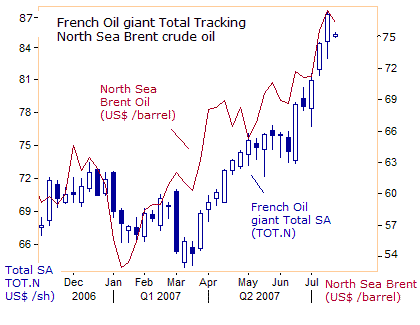
Perhaps the most effective means of punishing would be to cutoff Tehran from the Euro, depriving it of a badly needed medium of exchange, for its oil. But and are big importers of Iranian oil, so it's doubtful Europe would cut Tehran off from the Euro. But California Democrat Tom Lantos aims to put an end to Europe 's cozy business dealings with the Ayatollah.
L egislation aiming to punish foreign companies that do business with took a big step forward on June 26 th . The foreign affairs panel of the House of Representatives passed a proposed law by 37 votes to one, to curtail the president's ability to waive sanctions against foreign companies doing business with . It also provides increased congressional oversight regarding the way the administration implements the legislation.
“Until now, abusing its waiver authority and other flexibility in the law, the Executive Branch has never sanctioned any foreign oil company that invested in Iran. Those days for the foreign oil industry are over. The corporate barons running giant oil companies, who have cravenly turned a blind eye to Iran's development of nuclear weapons, have come to assume that the Iran Sanctions Act will never be implemented. This charade will now come to a long-overdue end,” Lantos declared.
Iran Aligned with “Axis of Oil,” counterweight to US Military
Washington is saber rattling in the Persian Gulf, sending the USS Enterprise to join the USS Stennis and the USS Nimitz naval carriers, building up the largest sea, air, marine concentration the United States has ever deployed opposite Iran. The “Big E” leads a strike group of guided-missile destroyers, the guided missile cruiser USS Gettysburg, and the SS Philadelphia nuclear submarine.
Washington is also considering deploying the fourth US carrier to the Red Sea opposite the Saudi Arabian western coast to secure the Gulf of Aqaba and the Suez Canal. But Iran has taken delivery of four submarines from North Korea, and may be mobilized near the Strait of Hormuz and pose threats to US naval vessels.
Tehran has aligned itself with the “Axis of Oil” including Russia and Venezuela, comprising the world's second, fourth, and eighth largest oil exporters. Iran sits atop the world's second-largest oil and gas reserves, and Venezuela's Hugo Chavez has cornered the vast deposits of heavy oil in the Orinoco Belt, which might contain up to 360 billion barrels of oil. Chavez has threatened to cutoff oil exports to the US, if Bush decides to attack Iran's nuclear facilities
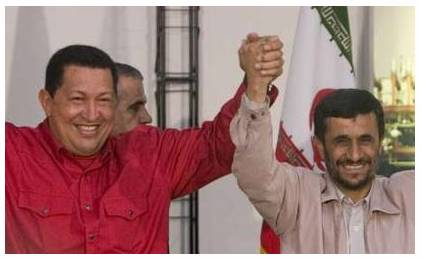
On July 2nd, Venezuela's fiercely anti-US President Hugo Chavez held talks with his “ideological brother” Mahmoud Ahmadinejad, on the last leg of a tour of nations at loggerheads with Washington. “When I come to Iran Washington gets upset” Chavez declared. Last month, Chavez, pushed US oil giants Exxon Mobil and Conoco Philips out of his country as part of his self-styled socialist revolution, “This is the unity of the Persian Gulf and the Caribbean Sea,” he declared.
“Those who try to convince the world that in Iran there are a bunch of barbarians are barbarians themselves. It seems that the United States is destined to fill the entire world with misery while speaking in the name of freedom. This is happening in Iraq, in the Middle East, in Latin America. The United States' empire is the greatest threat that exists in the world today,” Chavez told Iran's hard-line Kayhan daily.
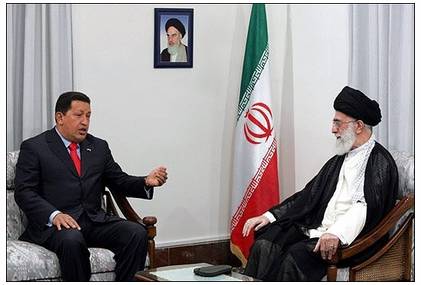 The Supreme Leader of the Islamic Revolution, Ayatollah Ali Khamenei conferred with the visiting Venezuelan President Hugo Chavez on July 1st. Referring to the US failures to harm Iran and Venezuela, Ayatollah Khamenei said “the US is bent on hurting independent countries, counting mainly on its apparent clout and dominance, but its political structure is in fact suffering from serious malfunction.”
The Supreme Leader of the Islamic Revolution, Ayatollah Ali Khamenei conferred with the visiting Venezuelan President Hugo Chavez on July 1st. Referring to the US failures to harm Iran and Venezuela, Ayatollah Khamenei said “the US is bent on hurting independent countries, counting mainly on its apparent clout and dominance, but its political structure is in fact suffering from serious malfunction.”
Last month, in an effort to ward off a possible US-led embargo of gasoline to Iran, Khameinei ordered the rationing of gasoline, which is expected to reduce imports by $4 billion per year. International traders ship about 210,000 barrels of gasoline per day to Iran, mainly come from India, the Netherlands, France and the United Arab Emirates. “Our enemies have confessed, that if gasoline consumption is contained and reduced, Iran will become invincible,” Ahmadinejad declared.
Washington has imposed an arms embargo against Venezuela, but Russia and Venezuela have signed arms deals worth $3 billion over the past 18 months, including 30 Russian Sukhoi-30 fighter jets, 53 helicopters, and 30,000 AK-103 automatic rifles. Chavez is expected to sign a contract that would include five Project 636 Kilo-class diesel submarines, and possibly four other submarines later.
“I am determined to expand relations with Russia,” Chavez, told Russian kingpin Vladimir Putin last month, adding that his determination stemmed from their shared vision of the global order. “We must defeat imperial hegemony that is imposed on us or we head toward barbarism, we either defeat imperialism or imperialism destroys the world. The empire must understand that it cannot dominate the world.
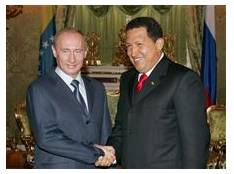 The Interfax news agency, said Chavez may sign contracts for Russian air defense systems. “We must continue developing the anti-imperialist weapon. We must think and prepare for the resistance war everyday,” Still, Chavez is reluctant to demand that the US pay for Venezuelan oil in Euros. Chavez fears the possibility that American soldiers would invade Venezuela to seize control of the South American nation's immense oil reserves.
The Interfax news agency, said Chavez may sign contracts for Russian air defense systems. “We must continue developing the anti-imperialist weapon. We must think and prepare for the resistance war everyday,” Still, Chavez is reluctant to demand that the US pay for Venezuelan oil in Euros. Chavez fears the possibility that American soldiers would invade Venezuela to seize control of the South American nation's immense oil reserves.
Putin praised the growing energy and trade ties between Russia and Venezuela. “Venezuela is a natural partner for us. Venezuela occupies first place on the American continent for oil reserves and eighth place in the world for gas reserves. This means colossal potential opportunities. I am very pleased that our companies are in the process of seeking joint decisions in the field of energy, and not only energy but also machine-building, space, and metallurgy,” Putin added.
Federal Reserves Ignores Higher Energy and Food prices
Since crude oil is denominated in US dollars outside of Iran and Russia, the Federal Reserve has a special role to play in protecting the purchasing power of the dollar, and to prevent an upward spiral in global inflation. However, on July 10th, Fed chief Ben “helicopter” Bernanke appeared to firmly endorse the his long-standing practice of ignoring swings in food and energy in setting monetary policy.
Bernanke went a step further and said that the M3 money supply did not have a “special role in the formulation of US monetary policy. Our experience has been that financial innovation and other factors have tended to create a relatively weak relationship in the short run between money and inflation and money and output,” he told the National Bureau of Economic Research.
Back in February 2006, Texas Representative Ron Paul asked Bernanke if the Fed would reconsider publishing the M3 money supply. Bernanke replied, “The reason for the planned cessation is that the Fed staff had not found M3 as a useful indicator of monetary policy. Therefore, in order to reduce the reporting costs to financial institutions, the Fed had decided to drop the calculation and publication of M3.” (could Bernanke print an extra few million dollars to cover the cost?)
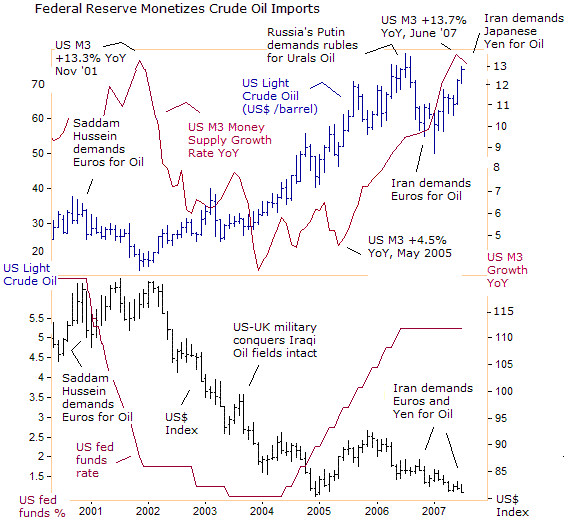
It's not surprising, because since Bernanke took over the helm of the Federal Reserve, the growth rate of the US M3 money supply has expanded rapidly to a 13% annualized clip, just shy of a 30-year high, and up from 8% in March 2006. Much like the ECB, the Fed is expanding the M3 money supply to immunize the US economy and stock market from sharply higher prices of crude oil.
The rapid expansion of the US money supply has sent the US dollar to its lowest level in 26-years against the British pound, an 18-year low against the Australian dollar, a 30-year low against the Canadian dollar, and an all-time low against the Euro. So oil exporters are quick to dump the US dollar and convert into appreciating currencies after initially accepting payment in the greenback.
A weaker US dollar, double-digit growth of the money supply, and sharply higher oil and food prices is a prescription for higher inflation. Most folks would probably agree with that. According to the IMF, food prices are 23% higher around the globe than 18-months ago, largely due to stronger demand for agricultural commodities to make ethanol and other bio-fuel substitutes for crude oil.
The price of a bushel of corn is up about 50% since spring of last year, and has led to rising costs for other foods and meats, because corn is an essential part of the US food-supply chain. Farmers use corn to feed dairy cattle, poultry and other livestock. Corn-based syrups flavor sodas, and corn oils are used in a variety of foods. Other pressures driving up the price of food include higher fuel costs, from surcharges passed along for transportation.
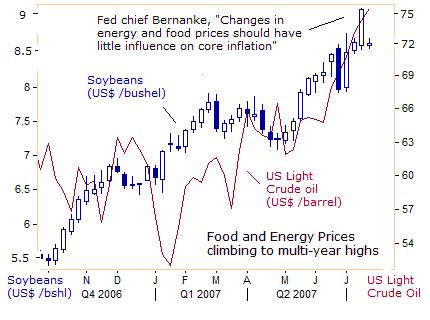
Soybean prices rose to their highest level since 2004, climbing above $9 per bushel and up 54% since October, tracking trend in crude oil prices, as demand for bio-fuels fuels boosted demand for vegetable oils. Soybean prices also rose on speculation that increasing use of ethanol made from corn in the US will require farmers to switch more acreage from soybeans to corn next year. Rising demand for bio-fuel helped send soybean oil to a 23-year high.
Of course, Bernanke's sleight of hand is backed up heavily doctored inflation statistics, conjured up by government apparatchniks. The mainstream media relays the inflation propaganda to the public, with a stamp of approval from Wall Street economists. But with a hyper inflating stock market in the background, savers in the US bond markets are the big losers from Bernanke's money printing operations.
The Int'l Energy Agency is begging the Arab Oil kingdoms to dip into their spare capacity and open the oil taps wider to lower oil prices. But on July 16th, Libyan oil chief Shokri Ghanem rejected the call for higher output. “There is no shortage of oil, but there are refining bottlenecks, panic in the market, speculation, and the political situation in the Middle East. No-one is saying there is no oil in the market,” he said.
Arab oil exporters are paid in heavily inflated US dollars, which are losing their purchasing power against the Euro and British pound. Arab oil kingdoms are keeping a tight lid on the oil supply to buoy prices, to offset the Fed's devaluation of the US currency. It's a vicious cycle that doesn't end, until Helicopter Ben and his reckless cohorts in Asia and Europe, tighten up on the money supply.
This article is just the Tip of the Iceberg, of what's available in the Global Money Trends newsletter! To find out how high crude oil can fly, and how low the US$ can go, subscribe today. Here's what you will receive with a subscription,
By Gary Dorsch,
Editor, Global Money Trends newsletter
http://www.sirchartsalot.com
Insightful analysis and predictions for the (1) top dozen stock markets around the world, Exchange Traded Funds, and US home-builder indexes (2) Commodities such as crude oil, copper, gold, silver, the DJ Commodity Index, and gold mining and oil company indexes (3) Foreign currencies such as, the Australian dollar, British pound, Euro, Japanese yen, and Canadian dollar (4) Libor interest rates, global bond markets and central bank monetary policies, (5) Central banker "Jawboning" and Intervention techniques that move markets.
GMT filters important news and information into (1) bullet-point, easy to understand analysis, (2) featuring "Inter-Market Technical Analysis" that visually displays the dynamic inter-relationships between foreign currencies, commodities, interest rates and the stock markets from a dozen key countries around the world. Also included are (3) charts of key economic statistics of foreign countries that move markets.
A subscription to Global Money Trends is offered at only $150 US dollars per year for “44 weekly issues”, including access to all back issues. Click on the following hyperlink, to order now, http://www.sirchartsalot.com/newsletters.php Call toll free from USA to order, Sunday thru Thursday, 2 am to 4 pm EST, at 866-576-7872.
Mr Dorsch worked on the trading floor of the Chicago Mercantile Exchange for nine years as the chief Financial Futures Analyst for three clearing firms, Oppenheimer Rouse Futures Inc, GH Miller and Company, and a commodity fund at the LNS Financial Group.
As a transactional broker for Charles Schwab's Global Investment Services department, Mr Dorsch handled thousands of customer trades in 45 stock exchanges around the world, including Australia, Canada, Japan, Hong Kong, the Euro zone, London, Toronto, South Africa, Mexico, and New Zealand, and Canadian oil trusts, ADR's and Exchange Traded Funds.
He wrote a weekly newsletter from 2000 thru September 2005 called, "Foreign Currency Trends" for Charles Schwab's Global Investment department, featuring inter-market technical analysis, to understand the dynamic inter-relationships between the foreign exchange, global bond and stock markets, and key industrial commodities.
Copyright © 2005-2007 SirChartsAlot, Inc. All rights reserved.
Disclaimer: SirChartsAlot.com's analysis and insights are based upon data gathered by it from various sources believed to be reliable, complete and accurate. However, no guarantee is made by SirChartsAlot.com as to the reliability, completeness and accuracy of the data so analyzed. SirChartsAlot.com is in the business of gathering information, analyzing it and disseminating the analysis for informational and educational purposes only. SirChartsAlot.com attempts to analyze trends, not make recommendations. All statements and expressions are the opinion of SirChartsAlot.com and are not meant to be investment advice or solicitation or recommendation to establish market positions. Our opinions are subject to change without notice. SirChartsAlot.com strongly advises readers to conduct thorough research relevant to decisions and verify facts from various independent sources.
© 2005-2022 http://www.MarketOracle.co.uk - The Market Oracle is a FREE Daily Financial Markets Analysis & Forecasting online publication.


